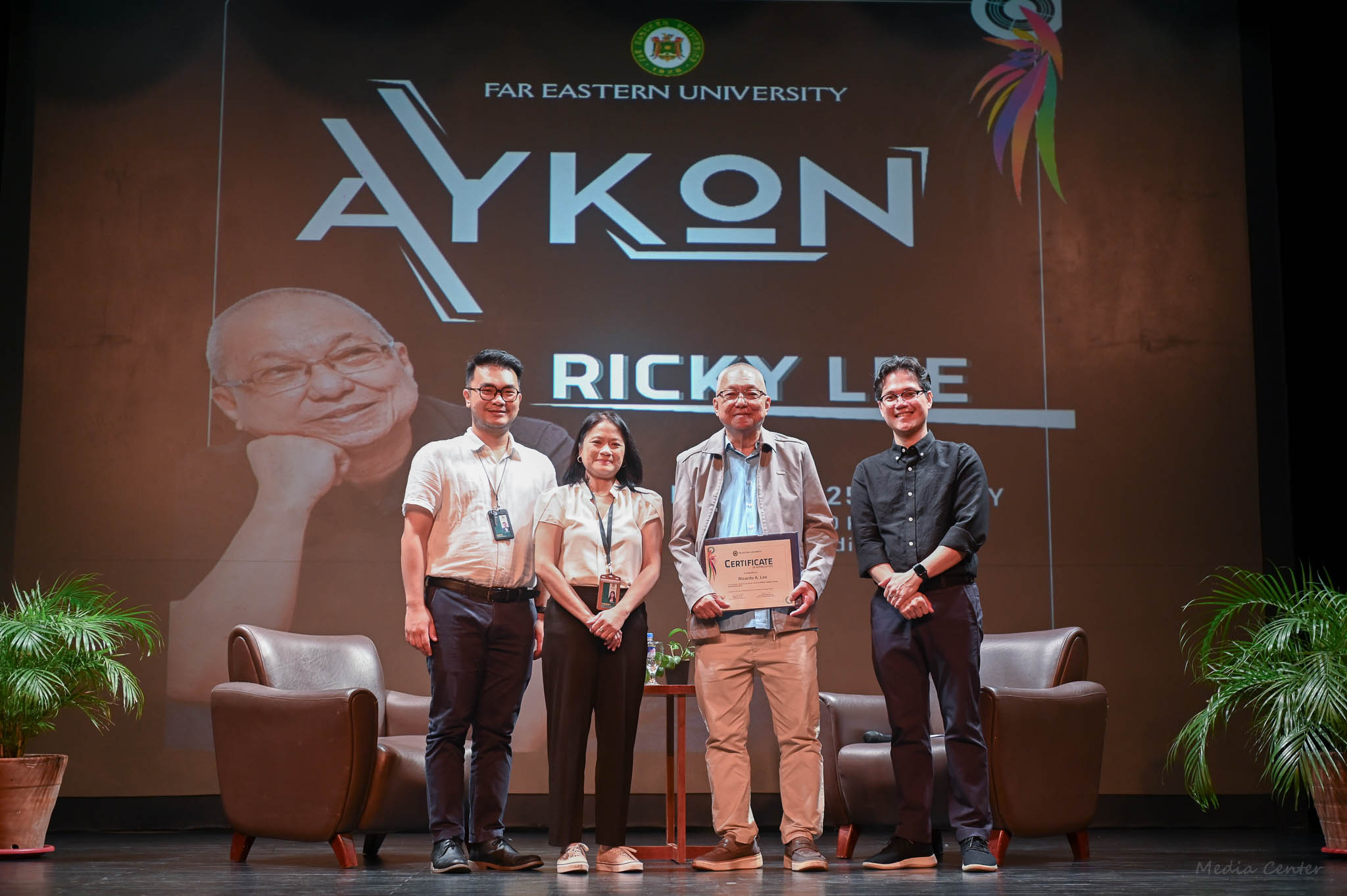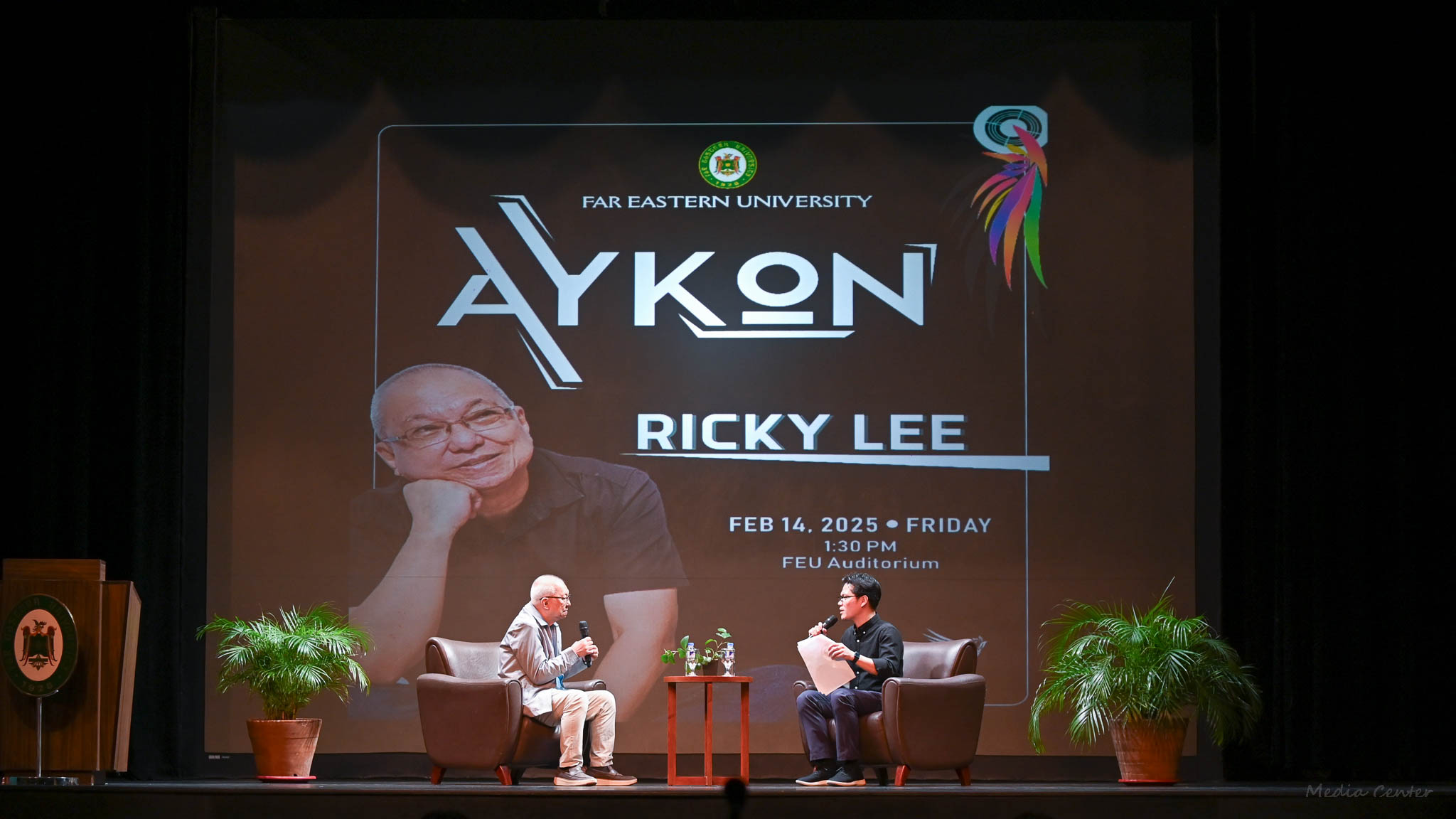In partnership with the Department of Communication, the Institute of Arts and Sciences hosted AYKON: Alagad at Yaman ng Konkretong Obra, a conversation series honoring the influential personalities in Philippine arts, sciences, business, and society.
The event took place on February 14, 2025, at the Main Auditorium, featuring National Artist for Film and Broadcast Arts Ricky Lee. As a multi-awarded screenwriter and literary figure, Lee has influenced Filipino storytelling for decades.
During his conversation with Dean Diego Jose Abad of the Institute of Arts and Sciences, Lee shared his inspirations, influences, and creative processes that helped with his career.
His unique approach to writing stems from his childhood experience and a blend of cultural influences. He described himself as a “mix-mix” of different identities—his father was Chinese, his mother Filipino, and he was a Bicolano-Chinese studying English at the University of the Philippines – Diliman while writing in Filipino.
Beyond his heritage, Lee emphasized the importance of reading on his development as a writer. He drew inspiration from literary giants such as Nick Joaquin and Bienvenido Santos. Describing himself as a voracious reader, he shared, “Reading was my way of escaping. Noong una, escaping away from the realities and then later it became escaping into a world where everything is possible for me.”
His love for literature also became the foundation of his storytelling, which helped him meld realism with imagination.
His hometown Daet, Camarines Norte also played a role in shaping his sensibilities. “Kung nasaan man ako ngayon, utang na loob ko sa Daet…Dala-dala ko ang Daet ngayon sa mga sinusulat ko, yung mga sensibilidad ko noon sa Daet, dala-dala ko ngayon,” Lee shared, emphasizing how his roots have influenced his writing.
When asked how he adapts to working with different brilliant directors such as Lino Brocka, Marilou Diaz-Abaya, Mike De Leon, Ishmael Bernal, Olive Lamasan, and Joel Lamangan, Lee stressed the relevance of openness to collaboration. He recalled his work with Bernal on Himala (1982), where they often challenged each other’s ideas. Through this process, he discovered what he calls the “ikatlong katas”—a prominent idea that emerges from creative clashes.
“Open ang mind ko. Hindi ako saradong tao. And inuulit ko, I think, dahil sa karanasan ko sa buhay. Binuksan ako. Hindi ako sarado…Wala sa’king mga ‘dapat’, sobrang bukas.”
His openness also shaped his perspective on dealing with writer’s block. In his response about overcoming creative struggles, Lee shared that inspiration is everywhere. According to him, by simply turning on the news presents countless potential stories waiting to be told.
However, Lee also highlighted that rejection and failure are integral to the creative process. “Simula ng career ko rejection na agad. Ang dami kong hindi natanggap na script early in my career na hindi natuloy, so I think yung rejection is part ng trabaho nating lahat lalo na sa Arts… I think it’s the hardships, the rejections, the mistakes that will make you better.”
Lee also underscored the need for continuous improvement. “I think you should never settle. I think you should keep striving to be better and better kasi wala naman talaga standard na nagsasabing ‘This is the best already.’ Everything changes.”

In addition to his experiences in film and literature, Lee also shared how much he learns from the participants of his writing workshops. “Madalas sabihin ng mga tao na ang swerte-swerte nila na nakapasok sila sa workshop ni Ricky Lee dahil ang dami nilang natututuhan. Pero hindi nila alam na mas marami akong natututuhan mula sa kanila.”
Lee acknowledged that every workshop batch expands his creativity in new directions, which serves as learning moments for him.
The AYKON with Ricky Lee concluded with a photo opportunity featuring Dean Diego Jose Abad, Associate Dean Francis Esteban, Department of Communication Chair Christina Stella Ustaris, along with the students, faculty, and audience members who participated in the event.
